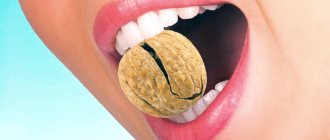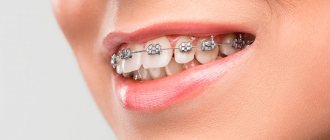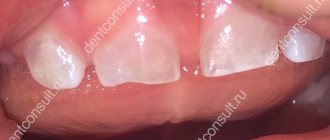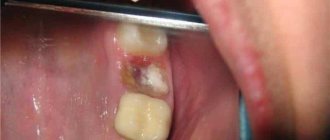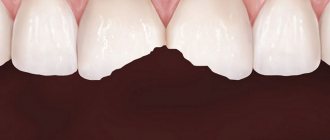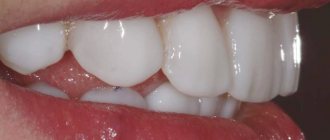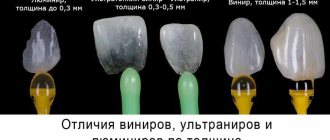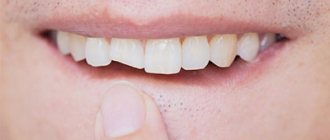Home / Articles / Teeth falling out - what to do
The absence of a tooth, especially the front one, always provokes a lot of problems. The main one is a decrease in a person’s self-esteem, because in the absence of a beautiful smile, everyone will avoid communication. At the same time, tooth loss can be accompanied by numerous physiological problems. The contours of the face may noticeably change, and insufficient chewing of food can even provoke disturbances in the functioning of the stomach, although even this is not the worst consequence.
Sign up for a free consultation >>
Why do teeth fall out
If your teeth begin to fall out, think about the reason for their loss. There are several common reasons why teeth fall out in humans:
Caries
Caries disease is accompanied by a violation of the mineralization of teeth, which ultimately destroys bone tissue in the oral cavity. Inside the tooth, the cavity gradually grows and becomes empty, which leads to acute sensitivity and food particles getting inside the teeth. Ignoring the symptoms of caries and unwillingness to consult a professional dentist ultimately leads to the fact that the tooth completely ceases to perform its function. The only solution in this case is to pull out the tooth.
It is possible to avoid caries by brushing your teeth properly and using toothpaste rich in fluoride. If even small holes appear in the teeth, it is recommended to immediately fill them in a specialized clinic.
Periodontitis
The first symptoms of the disease are bleeding in the gums. Next, an unpleasant odor appears in the oral cavity and a purulent process begins when pressure is applied to the gums. After some time, the affected tissues become completely incapacitated. Therefore, if your tooth falls out with blood, often the reason lies precisely in periodontitis.
Prevention of the disease in this case is quite simple: monitor the health of your gums and always visit the dentist in a timely manner, without waiting until the pathology becomes incurable. After each meal, try to brush your teeth for three minutes using special dental floss and toothpaste.
Chronic diseases
The reason why teeth fall out without pain and blood, and sometimes with them, can also be inflammatory processes as a result of chronic diseases. Common causes are hypertension, thyroid problems, diabetes, and respiratory problems. Often, aggressive methods of treating serious diseases, in particular chemotherapy, can provoke dental problems.
Negligent oral care, improper diet
It's no secret that citrus drinks can deplete enamel, which causes erosion. Gradually, this stimulates the development of caries and leads to the final loss of the tooth. A similar effect can occur if you carelessly eat nuts, crackers and other hard items. Clefts appear in the teeth, they become loose and subsequently fall out. Try to avoid eating excessively hot and cold foods.
Tobacco products, drugs
About a third of patients who systematically lose teeth are people with bad habits, in particular, heavy smokers. It is reliably known that drugs and tobacco not only worsen the color of teeth, but can also be the reason why molars fall out.
Recommendations for everyone
Are there any general recommendations that are effective in all cases?
Yes, I have. The first and most important thing is not to panic. Usually, tooth loss is accompanied by panic and surprise. Especially if an unpleasant event occurred during a meal or during another event, when nothing foreshadowed trouble.
When panicking, a person makes mistakes that will still have to be corrected later. Therefore, the first and most important recommendation is not to panic.
The second recommendation is to trust dentists. It is better not to self-medicate, but to turn to specialists. Let them examine, make a diagnosis, and do everything necessary to keep your mouth healthy. After all, health is not something that can be entrusted to amateurs, not professionals.
Otherwise, healthy teeth and may none of the readers ever need dental services.
Why teeth fall out in adults and children.
Tooth loss is a bad sign that most often causes anxiety in people. The problem is, of course, serious, but it also has various solutions.
Tooth loss in children
When (at what age) do baby teeth fall out? Typically, the first milk teeth fall out in children aged 6-7 years, but deviations from the timing are possible based on the individual characteristics of the body. Although baby teeth erupt at the age of 6 months, their formation begins in the uterine period during the mother’s pregnancy. With the birth of a child, the formation of the rudiments of permanent teeth begins, which is why it is important to monitor the health of the milk teeth, because infection with caries can easily harm the rudiments of permanent teeth.
Do teeth fall out on their own?
Yes, they fall out if they are dairy. In this case, changing teeth can be accompanied in children by acute painful sensations, swelling of the gums and sensitivity of the enamel, and in some cases even itching. If you experience these symptoms, it is important to seek the advice of a professional dentist. At the same time, while waiting to see which tooth falls out first, you should not forget about the child’s adequate nutrition so that the body and teeth in particular continue to receive all the necessary vitamins and microelements.
When a baby tooth falls out, the wound may continue to bleed for 5-10 minutes. Simply give your child a sterile gauze or cotton swab to bite on the area where the baby tooth has fallen out. If bleeding continues for a long time, be sure to take your baby to the pediatrician to check blood clotting. The help of a dentist may also be needed when baby teeth complicate the eruption of permanent teeth. In this case, the teeth are forcibly removed.
Symptoms
The main clinical sign is a sharp pain that occurs at the time of injury. When you try to open your mouth or touch the area of injury, this symptom intensifies. This is due to damage to the pulp and soft tissues of the oral cavity.
The second sign is bleeding. It can be of varying intensity depending on the volume and location of the damage. The injured tooth begins to become very loose, sometimes its fragments fall out of the oral cavity.
A fracture of the tooth crown is noticeable upon examination. Its integrity is more or less compromised, the adjacent gum is hyperemic, and pinpoint hemorrhages may be observed. In case of injury, the pulp is usually exposed; such cases are particularly painful due to exposure of the nerve.
Fracture of a tooth at the root.
A tooth root fracture may not be noticed at first glance. It will stagger and may deviate from its normal position. Touch or slight pressure causes sharp pain. The crown may retain its original appearance or acquire a pink tint.
There are minor fractures in the form of chips, without opening the pulp. Such injuries are less painful and allow you to restore the anatomical integrity of the tooth in the shortest possible time.
A child's baby teeth are not as strong as permanent teeth, so they break quite often. The risk factor is an active lifestyle, typical for most children.
What to do if teeth fall out
Many patients are interested in the question of what to do if a tooth falls out at home. Of course, in a number of such cases no additional measures are required - for example, if a tooth falls out in the side of the jaw, which is not visible when communicating with other people. However, the need to restore a lost tooth may not only become necessary if the tooth falls out from the front. Since the load on the jaw is unevenly distributed, this can ultimately lead to jawbone atrophy. The only way out of the current conditions is to install a dental implant.
If a patient has lost a front tooth, or if it was deliberately removed, it is possible to restore a beautiful smile with the help of a bridge. A similar solution is appropriate if the permanent lower tooth falls out, which is subject to the greatest load when eating food. The use of a bridge is also appropriate if false teeth, rather than permanent ones, have fallen out.
Why does a filling fall out?
Filling loss is an equally common problem with the human oral cavity. This also creates an uncomfortable feeling, especially when eating: the chewing process becomes more difficult, and pain symptoms begin. If a filling has fallen out of your tooth, be sure to seek help from a professional dentist in your city.
There are a wide variety of reasons why a filling may suddenly fall out of a tooth. The most common among them is the use of low-quality materials in the filling, as well as improper shrinkage of the filling inside the tooth . This can cause a small hole to form between the tooth and the filling, which becomes clogged with food and becomes a breeding ground for bacteria. Often this situation is complicated by the appearance of secondary caries.
Often the loss of a filling is associated with the expiration of its service life . On average, based on installation technology and manufacturing material, a filling lasts about 7 years. Regular visits to the dental clinic will help determine when the need to replace the filling arises.
Other reasons why fillings may fall out are a lot of pressure on the tooth (in particular, due to strong impacts or cracking of a nut), as well as failure to maintain proper oral hygiene.
Treatment of ankylosis
Treatment of ankylosis with traditional orthodontic methods (braces) is impossible. The tooth grows into the bone and it is impossible to return it to its correct position. But restoring the functionality of the dentition is quite possible. In dental clinics, the method of treatment is selected individually in each individual case.
First of all, the patient is referred for a dental computed tomography scan. The dental surgeon studies panoramic images and draws up a treatment plan. Most often, surgical treatment methods are used: excess fibrous tissue is removed and joint mobility is restored. Crowns made of metal-ceramics, ceramics and zirconium dioxide are also used to treat dental ankylosis. With their help, the bite is corrected.
What to do if a filling falls out
Losing a filling is a common problem, but does not have any negative consequences other than the pain associated with the reopened nerve. If a temporary filling falls out at the most inopportune moment, try to contact your dentist as soon as possible. Given that the tooth cavity is opening up again, delaying the process of installing another filling can lead to aggravation of the problem, especially if food particles get into the tooth cavity.
Before starting treatment for a temporary filling that falls out, dentists determine the reason for the loss. Based on specific conditions, a certain material is selected, and treatment occurs using a certain technology. During the treatment, the remains of the previous filling are eliminated, the oral cavity is thoroughly processed, and then the damaged tooth is restored.
Until the dentist restores the lost filling and numbs the pain, the only possible measure the patient can take is not to place excessive stress on the damaged tooth. It is advisable to chew food on the other side of the jaw, and when brushing your teeth, treat the damaged area more carefully. It is also recommended to rinse your mouth more often to protect the damaged tooth from possible penetration of food debris with microbes and bacteria into it.
Statistics confirm that about 39% of people who complain about dental problems try to avoid visiting doctors. Fear of instruments and drills is quite justified, as is fear of possible discomfort when treating teeth and gums. However, it is precisely those patients who undergo systematic examination by dentists who avoid the biggest troubles throughout their lives. These include tooth loss.
Sign up for a free consultation >>
View prices
Making an appointment with a dentist
